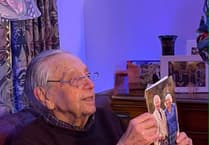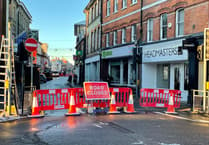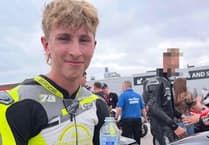Last week we recounted the incredible story of Farnham’s It’s a Knockout team of 1974 and their televised victory against Swindon’s Thamesdown team in Farnham Park.
Today, it is time to tell the story of the team’s European exploits – watched by as many as 110 million people across the continent.
More than two months on from their May 1974 victory in Farnham Park, the Farnham team flew from Heathrow to Geneva on Sunday, July 21, ready for their Jeux Sans Frontières international heat in the Roman amphitheatre at Avenches, Switzerland.
The team consisted of eight men, four women, plus a male and female captain, wearing red uniforms to represent their country, supplied by Clark & Co in The Borough.

The mayor of Farnham also travelled with the contestants as a guest of the BBC.
Farnham competed against sides from Holland, Germany, Switzerland, France, Belgium and Italy in heat four of seven. The British team with the best placing across all the heats would go on to represent GB in the final in September.
At the opening ceremony, the Herald reported the girls in the Farnham team “proved very popular with the male members of the Italian team, with one Italian seen to go round four times for the ‘traditional’ kisses”.
And once the games began, Farnham again came flying out of the blocks – playing their joker card in the opening round.
Echoing the Roman theme, this involved a tug-o-war between a male contestant dressed as a gladiator and a team of three women from an opposing team, with a fourth woman dressed as a ‘lion’ in the middle ready to devour the loser.
In torrential rain, Farnham’s women triumphed – and just as they had done in Farnham Park, they would never relinquish the lead through the following rounds, eventually sharing the top spot with Italy after a late surge.

The Herald reporter telephoned in this report: “Watched by over 6,000 including the British consul, Farnham swept aside all the Continental opposition, only to be caught during the last two games.
“It was a superb team performance – which ended with incredible scenes of rejoicing in the waterlogged arena. Team supporters danced in the drenching rain and celebrated in true Continental style until the early hours.”
As the top team from GB, the Farnham side then travelled to Leiden in Holland to compete for the Jeux Sans Frontières golden trophy on September 18.
But sadly, it wasn’t to be.
“It’s all over for Farnham,” the Herald reported on September 20, 1974. “Despite valiant efforts by every member, Farnham failed to win the TV ‘Knockout’ final.
“After leading for the first three games, having triumphed in their ‘joker’ game, Farnham fell behind and tumbled to fifth place behind winners Muotathal from Switzerland.”

Analysing the defeat in 1974, Sarah Wickens – daughter of millionaire British Car Auctions founder David Wickins – told the Herald: “We were beaten by the mighty midgets from Muotathal. None of their girls was over 5ft 3ins and very few of their men were over 5ft 5ins.”
Another team member, Ian Carter, reflects: “Looking back over those 50 years, I don’t think any of us had any idea of how immensely popular the It’s a Knockout programmes were going to be.
“At a local level, I don’t think any other function held in Farnham has been attended by as many people.”
It was said at the time that the televised version of It’s a Knockout had 15.5 million viewers in Britain, while the European television audience for the final programmes was estimated at an enormous 110 million.
Ian continued: “If there is sufficient interest, it would great to have a reunion later in the year, this could include not only team members but anyone else who was involved in the day.”
All those interested are invited to contact Ian Carter at [email protected]
What was It's a Knockout?
The popular British game show was first broadcast in 1966, adapted from the French show Intervilles, and was part of the international Jeux sans frontières franchise.
Farnham featured in series nine of It’s a Knockout, aired on BBC TV over 13 episodes from May 3 to September 20, 1974.
Teams representing a town or city completed tasks in absurd games in the home town's park. As the home side, Farnham competed at Farnham Park.
The team scoring most points would advance to the next stage. Teams could double points in one round by choosing to ‘play their Joker’, as Farnham deployed successfully at the beginning of each of their appearances in the competition.
The 1974 games were refereed by rugby league commentator Eddie Waring while the latterly-disgraced broadcaster Stuart Hall presented each episode.
The games were described as school sports day for adults. In the Farnham Park event, these ranged from the Fireman’s Throw where a team of “four boys” had to propel a large ball over a number of hurdles with a canvas sheet, to the Canvas Run where four men pull a carpet back and forth while two girls – one at a time – have to run along the carpet and through a number of hurdles while carrying a large jelly.
Other events included the Balista and Flour Bags, Motor Bike Relay, Wheelbarrow Race, Water Trapeze, Push and Slide, and the ‘Marathon’ Ball Race.
The winner of each edition was awarded an It's a Knockout! trophy and a chance to represent the UK in Jeux Sans Frontières, with around six to eight countries competing in the European finals.





Comments
This article has no comments yet. Be the first to leave a comment.